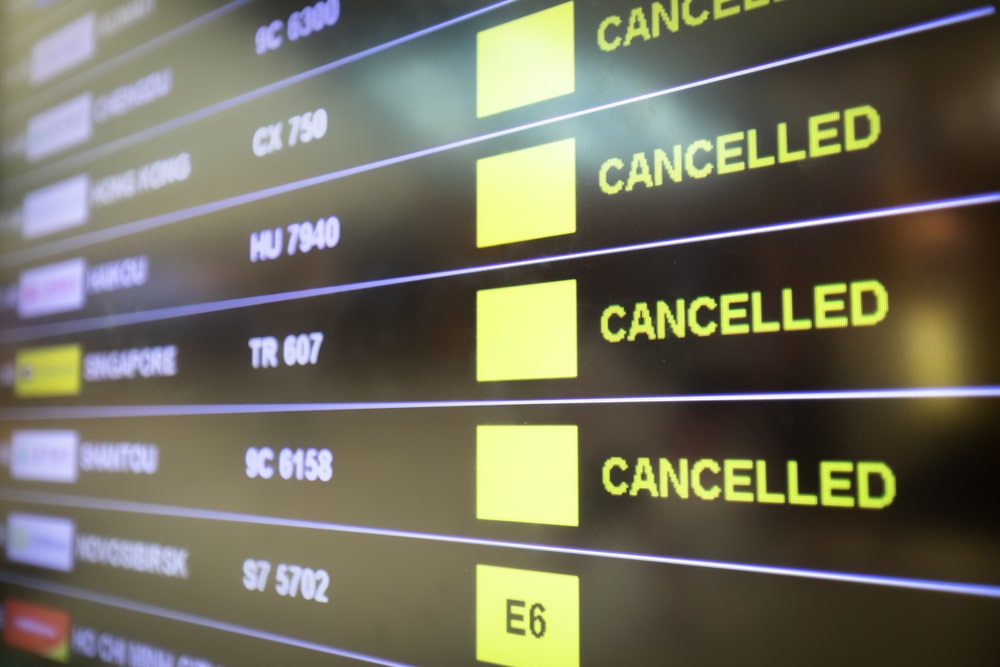
Severe weather disruption in UK and US results in flights delays or cancellations
Severe weather disruptions in both the United States and United Kingdom over the weekend have resulted in numerous flight cancellations and delays.
Many parts of the UK experienced a combination of snow, fog and heavy rain overnight on Saturday that led to the closure overnight of runways of major airports including Birmingham, Bristol, Leeds Bradford, Liverpool, Manchester and Newcastle.
152 departing flights and 136 arriving flights to and from UK airports were cancelled on Sunday, according to data by Cirium. This represents 6% of all scheduled UK departures and 5% of all UK arrivals on Sunday.
The worst affected airports were Manchester (33 departures and 27 arrivals cancelled), Heathrow (20 departures and 18 arrivals cancelled), Leeds-Bradford (15 departures and 10 arrivals cancelled), Gatwick (12 departures and 9 arrivals cancelled) and Liverpool (10 departures and 10 arrivals cancelled), according to aviation experts.
Jet2 delayed 19 inbound and 12 departing flights from Sunday to Monday, which included flights from Leeds Bradford, Liverpool, Manchester, East Midlands and Glasgow, covering destinations ranging from Canary Islands, Faro, Alicante, Geneva, Paris and Prague.
Similarly, a few EasyJet, Ryanair and TUI Airways flights faced long delays to departures from Bristol Airport on Sunday morning due to the bad weather.
Meanwhile, across the Atlantic, more than 60 million Americans are enduringStorm Blair, which is expected to bring the heaviest snowfall and coldest temperatures since January 2011.
The extreme cold weather, according to the BBC, is being caused by the polar vortex, an area of cold air that circulates around the Arctic. Temperatures (7-14c) below normal average have been forecasted.
1,700 flights in and out of the US were cancelled, and more than 8,300 were delayed on Sunday, according to FlightAware, a tracking website. Amtrack has announced widespread cancellations in anticipation of the weather.
Analysis by the BBC on inbound and outbound US flights revealed that Kansas City International Airport was the worst affected for outbounds, with 86% cancellations, and St Louis Lambert International Airport, for inbound flights, with 53% of flights delayed and 7% of flights cancelled.
Thirty US states ranging from the Midwest and Eastern US, which included the cities of Washington, Indianapolis and Philadelphia have been put on weather alerts, according to the National Weather Service (NWS). A state of emergency has been declared in Kentucky, Virginia, Kansas and Arkansas and Missouri.
Washington DC is bracing itself for heavy and snow and bitter cold on Monday, the same day as the US Congress is expected to meet to formally certify Donald Trump’s election as President.
However, this is in doubt, as officials have announced that federal offices in the nation’s capital will be closed.
Kansas is experiencing the worst snowfall in 32 years, with more than a foot (30 to 40cm) of snow coming down so far. Meanwhile, parts of Missouri have experienced 14 inches (36cm) of sleet and snow.
Whilst much of the snowfall is expected to lessen in these areas as it moves east over the next few days, it will open the doors to the Arctic across much of the Midwest and this will be driven south by strong northerly winds lowering temperatures into the Deep South with many ‘freeze’ warnings out across the Southern states, which rarely experience these conditions, even in the heart of winter.
These colder than average conditions are expected to persist across a large swathe of the Conus well into January with a southerly displacement of the Polar Vortex in the vicinity.
Closer to home, whilst not expected to be anywhere near as intense, this unusual pattern may lend itself to colder, more unsettled weather to start January with further snow and Ice risks, at times.
Russell will be monitoring these winter weather patterns, and their potential cross-class impacts.

Related Articles
Aviation
Aviation
Aviation